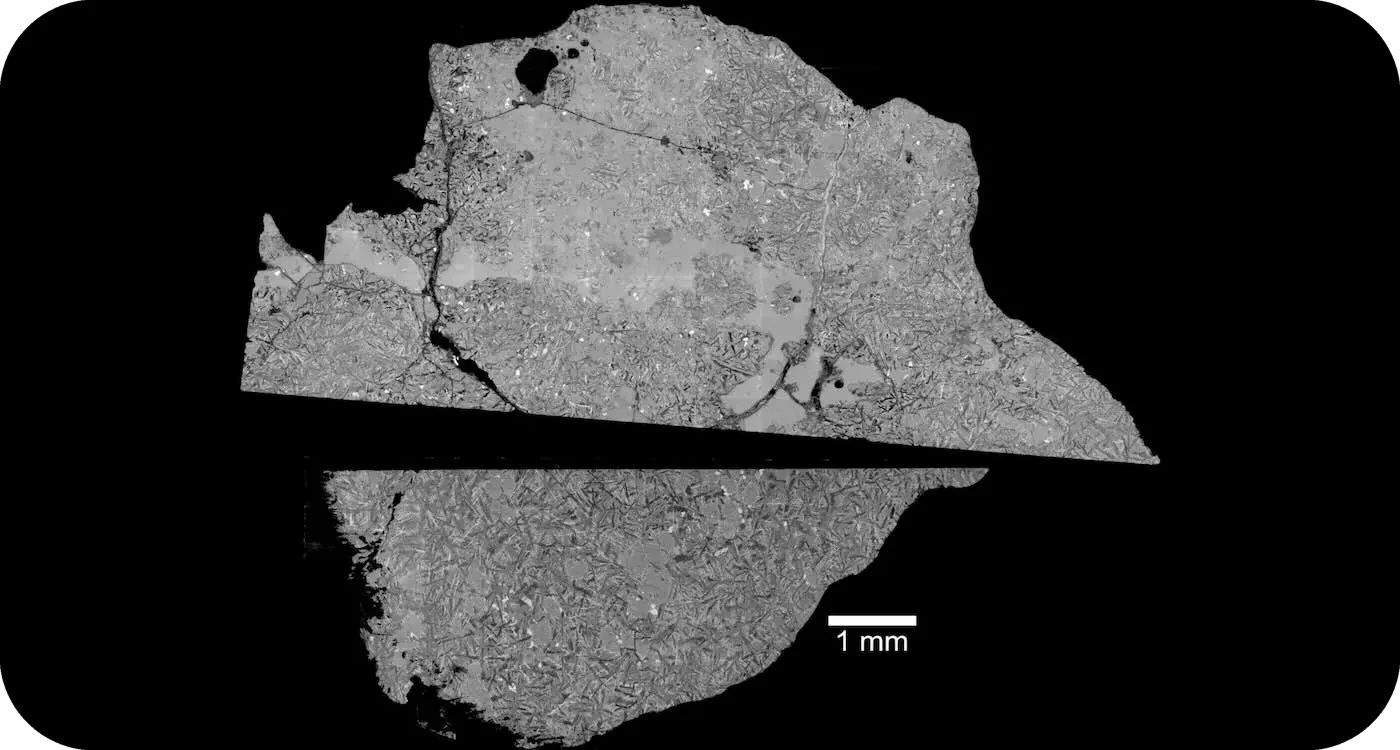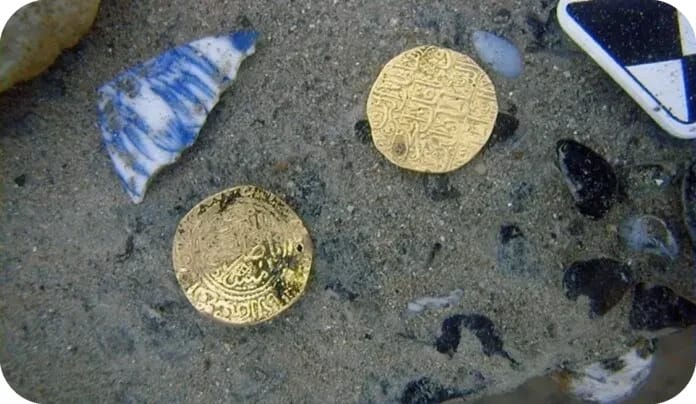- Daily Upsider
- Posts
- 🌞 2-Billion-Year Lunar Clue
🌞 2-Billion-Year Lunar Clue
Daily Upsider - Saturday, July 19th, 2025
Saturday, July 19th, 2025
Good Morning! 🌞
Imagine holding a piece of the Moon that’s older than most of Earth’s life. That’s exactly what scientists found in Africa—a 2.35-billion-year-old lunar meteorite that fills a billion-year gap in our understanding of the Moon’s volcanic history. It’s not every day a rock changes everything we thought we knew—but this one just might.
In today’s edition, we explore how this tiny fragment of space is offering a giant leap in lunar science. 🌑
Today’s Upside
Earth Science
2-Billion-Year Lunar Clue

Electron image with different shades of grey highlighting chemical compositions of the minerals making up the rock – CREDIT: Dr. Joshua Snape / University of Manchester
A newly discovered lunar meteorite is rewriting the timeline of the Moon’s volcanic history. Found in Africa in 2023, the rare 2.35 billion-year-old rock fills a billion-year gap in existing lunar samples and suggests the Moon remained volcanically active far longer than previously believed. Now confirmed as the youngest basaltic lunar rock ever found on Earth, it was the centerpiece of new research presented at this week’s Goldschmidt Conference in Prague, the world’s foremost geochemistry gathering.
According to researchers from the University of Manchester, the meteorite likely formed from lava that once erupted and cooled on the Moon’s surface. A later impact event launched the rock into space before it eventually landed on Earth. Its chemical composition—high in potassium, moderate in titanium, and rich in large olivine crystals—identifies it as an olivine-phyric basalt. “It just happened to fall to Earth and reveals secrets about lunar geology without the massive expense of a space mission,” said Dr. Joshua Snape, who led the research. “Lunar rocks from sample missions are fantastic… but they are limited to the immediate areas surrounding those mission landing sites.”
What sets this meteorite apart is its age and origin. Unlike samples from the Apollo, Luna, and Chang’e 6 missions, this rock is younger—yet still predates the much newer samples from China’s Chang’e 5. Lead isotope analysis reveals it came from a region of the Moon’s interior with a high uranium-to-lead ratio, pointing to sustained radiogenic heating. “Our analysis suggests an ongoing heat generation process… producing heat over a long period,” said Snape. Weighing just 311 grams, it’s one of only 31 officially identified lunar basalts on Earth. “This particular rock provides new constraints about when and how volcanic activity occurred on the Moon,” Snape added. “It will guide where to land future sample return missions.”
Good News
31 Escape Unharmed

Workers assembling the boring machine that was used in the tunnel when it collapsed – credit Salini Impregilo / WeBuild Group
A remarkable display of teamwork and training unfolded beneath Los Angeles last Thursday, as 27 tunnel workers safely escaped a partial collapse 450 feet underground. The crew had been working on the ambitious $500 million Clearwater Project—a 7-mile-long, 18-foot-wide tunnel designed to carry treated wastewater from Carson to the Pacific Ocean—when the ceiling behind the boring machine gave way. Thanks to quick thinking, strong collaboration, and a bit of luck, all 27 men, along with four rescuers, made it out without a single injury.
Emergency crews, including specialized urban search and rescue teams, were on the scene quickly. A narrow 3- to 4-foot opening remained, just enough for the workers to crawl through. Four colleagues on the other side helped widen the exit, allowing everyone to emerge safely within an hour. “I just spoke with many of the workers who were trapped,” wrote Mayor Karen Bass on X. “Thank you to all of our brave first responders who acted immediately. You are LA’s true heroes.”
Officials credited the successful outcome to the crew’s exceptional preparedness. Most of the workers were engineers and electricians trained by Flatiron Dragados, and their calm, coordinated response reflected their expertise. “They knew exactly what to do. They knew how to secure themselves,” said L.A. City Council member Tim McOsker. While Cal/OSHA investigates the cause—believed to be “squeezing ground,” where soil shifts under excavation pressure—construction is temporarily paused. Still, the Clearwater Project remains on track for a 2028 launch, ushering in a much-needed upgrade to LA’s wastewater infrastructure.
It’s easy to focus on what could have gone wrong—but this story is a powerful reminder of what happens when training, preparation, and human resolve come together under pressure. In a world full of headlines about disasters narrowly avoided, it’s worth celebrating one that ended in nothing but relief and gratitude.
History
Sunken Riches Found

credit – Center for Historic Shipwreck Preservation © supplied to GNN
Off the coast of Madagascar, a team of American marine archaeologists believes they’ve uncovered one of the most legendary pirate hauls in history. The shipwreck, located near the island of Nosy Boraha, is believed to be the Nossa Senhora do Cabo (Our Lady of the Cape)—a 700-ton Portuguese warship captured in 1721 by the notorious French pirate Olivier “The Buzzard” Levasseur. The vessel was reportedly carrying a vast treasure bound for the Portuguese crown, along with 200 enslaved people from Madagascar. While the treasure itself is long gone, recovered artifacts strongly match historical records, pointing to one of the most valuable pirate prizes ever claimed.
The discovery follows 16 years of sonar and diving surveys by researchers from the Center for Historic Shipwreck Preservation in Massachusetts. Nosy Boraha, formerly called Sainte-Marie, was once a key pirate stronghold during the Golden Age of Piracy. According to historical records, Nossa Senhora had stopped near the Reunion Islands for repairs after a storm when Levasseur and fellow pirate John Taylor launched their attack. Onboard were silks, nutmeg, ivory carvings, Chinese porcelain, religious relics, silver bars, gold coins, and an astonishing cache of precious stones—an estimated $100 million in today’s value. “Eye-watering treasure, even by pirate standards,” wrote two authors of the team’s published research.
Levasseur, born in Calais during the Nine Years’ War, became one of the most feared pirates of his time. His legacy includes two of the largest raids in pirate history and a rumored encrypted message pointing to buried treasure before his execution at age 40. The research team also uncovered several other nearby wrecks, highlighting the area as a hotbed for pirate activity. Their work, including field reports, underwater photos, and interviews, was recently featured in Wreckwatch Magazine, offering a deeper glimpse into a forgotten chapter of maritime history.
Support Daily Upsider!
Help our mission to share positive, meaningful news! Your support keeps us going without the need to bombard you with annoying ads!

In the Philippines, “kuya” literally means “older brother” in Tagalog — but in daily life, it’s so much more than that.
We say kuya to the tricycle driver who helps us with groceries, the security guard who greets us every morning, the neighbor who fixes the gate, or even a stranger who just happens to be older. It’s a small word that turns a quick request into something warmer, more respectful.
It shows how deeply society here is shaped by the spirit of family: even in crowded streets and fast-moving cities, we find ways to keep things personal. Every “kuya” carries an unspoken message: “I see you, and I trust you to look out for us younger ones.”
Origin: Tagalog
Literal meaning: Older brother
But really: A reminder that community isn’t just who we live with — it’s everyone we share our days with.
“Kuya, pahingi ng tulong?” (Kuya, can I ask for help?)
On this Social Saturday, take a moment to notice the kuyas around you — those everyday big brothers who keep the world turning quietly, kindly, and sometimes without thanks. 🌱✨
✨ Do you have a word in your language or culture that’s used like kuya — something that turns strangers into something closer to family?
Share it with us — we’d love to hear!
Mind Stretchers
⁉️

Answers to yesterday’s Mind Stretchers

— YOU ARE UNDER ARREST! Chris Hostetler got this correct first! 🌞
Be the first to send us the correct answer for today’s mind stretcher for a shout-out with the answer tomorrow. Just send us the answer and your name to [email protected] or reply to the email.
From the Community
If you have any uplifting stories and experience you might want to share, send those over to [email protected] for the chance to be featured.
Reply